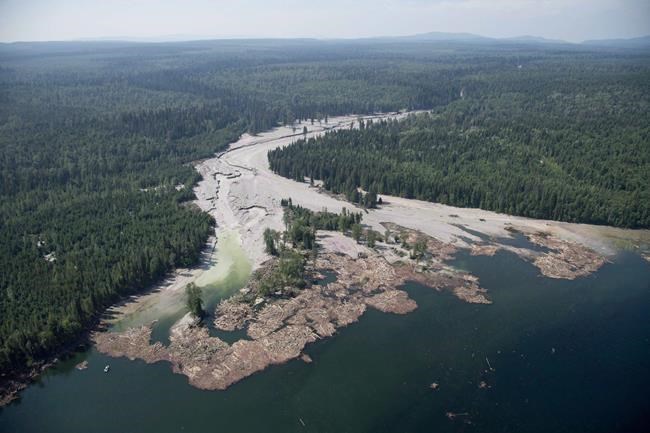
Contents from a tailings pond is pictured going down the Hazeltine Creek into Quesnel Lake near the town of Likely, B.C. on August, 5, 2014. It's been two years since millions of cubic metres of mine waste gushed from a tailings pond at the Mount Polley mine in British Columbia's Interior. The government says it has implemented tough new regulatory standards, while environmental groups say more protections are needed and residents just want their pristine lake back. THE CANADIAN PRESS/Jonathan Hayward
Republished August 03, 2016 - 4:41 PM
Original Publication Date August 03, 2016 - 1:00 PM
VICTORIA - Lisa Kraus says it's been a difficult two years in the tiny central British Columbia community of Likely, where the collapse of a massive tailings dam at the Mount Polley mine opened wounds that have yet to heal.
Twenty-four million cubic metres of mine waste and water gushed into nearby lakes and rivers on Aug. 4, 2014.
An independent, government-ordered panel of experts concluded the cause was an inadequately designed dam at the Imperial Metals (TSX:Ill) open pit copper and gold mine that didn't account for drainage and erosion failures beneath the pond.
One of the panel's geotechnical engineers described the location and design of the pond as loading a gun and pulling the trigger.
"We were woken up in the middle of the night," said Kraus, who lives on riverfront property just downstream from the mine site. "We had people camped down in our lower lot and we were told to wake them up ... because we were uncertain how much or what was going to come down from the lake into the river."
There were no casualties, but the collapse dumped millions of cubic metres of mine waste into Quesnel Lake and clogged salmon-bearing streams and rivers with waste and trees.
Kraus, who serves as Likely's chamber of commerce vice president and community co-ordinator, said despite government reports that water quality in Quesnel Lake meets provincial drinking quality guidelines, many residents are still concerned.
"All this year, we've had a green hue colour in the lake," she said. "A colour that's never been there before. It's a concern. We want it back the way it used to be."
Kraus said some people now refuse to drink the water.
"People here still fight with each other about it," she said. "They're frustrated because things aren't what they used to be. We don't want the mine to go away. We just want things done right."
Mines Minister Bill Bennett said the disaster prompted independent reviews and resulted in the province implementing world-leading regulatory standards for the mining industry.
But Bennett conceded it will take time for British Columbians to become confident and comfortable with the protections aimed at preventing similar disasters.
"It was a miracle nobody got hurt," he said. "There could have been people camped down at the mouth of Hazeltine Creek when that accident happened. There could have been workers on the dam. There wasn't. We just were really fortunate we've learned an important lesson without anybody being injured or worse."
B.C. revised its mining code to include global-leading safety and design standards for mine tailings storage facilities, Bennett said. It also strengthened the government's regulatory oversight of the mining industry and increased compliance and enforcement tools.
But the Sierra Club of B.C. and mining expert Dave Chambers said the province is not doing enough to hold mining companies to account and prevent future disasters.
The Sierra Club released a report by Chambers that concludes the government could do more to ensure safety at tailings storage facilities.
"Unfortunately, we continue to see overly optimistic predictions about water quality impacts and tailings dam design and operation that push the limits of credibility, largely because of financial pressure on both mine operators and consultants," said the report.
Sierra Club spokesman Bob Peart said British Columbians are not convinced the government is ensuring safety and protection of the environment are put ahead of mining company interests.
"Safety, stability should be paramount — not profit for the company or revenue for the government," he said.
Opposition New Democrat mines critic Doug Donaldson said much time has passed and yet nobody has been held accountable for the Mount Polley breach.
"That does little to bolster public confidence in this not happening again," he said.
News from © The Canadian Press, 2016